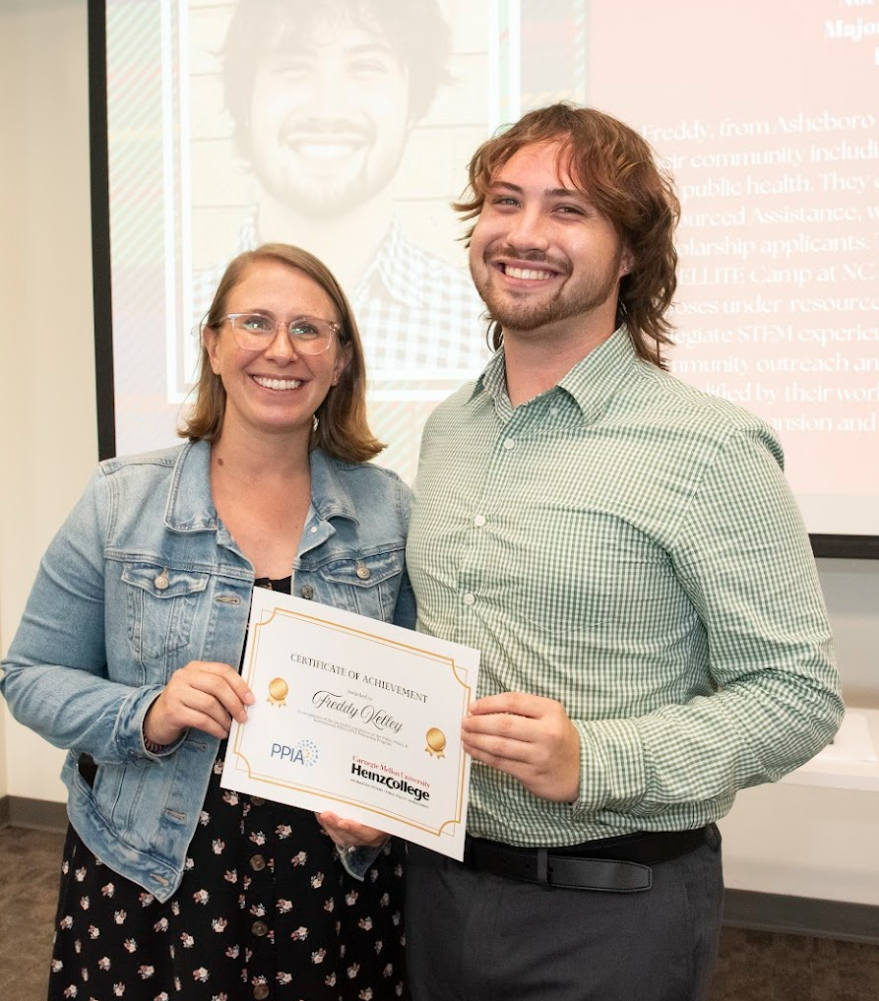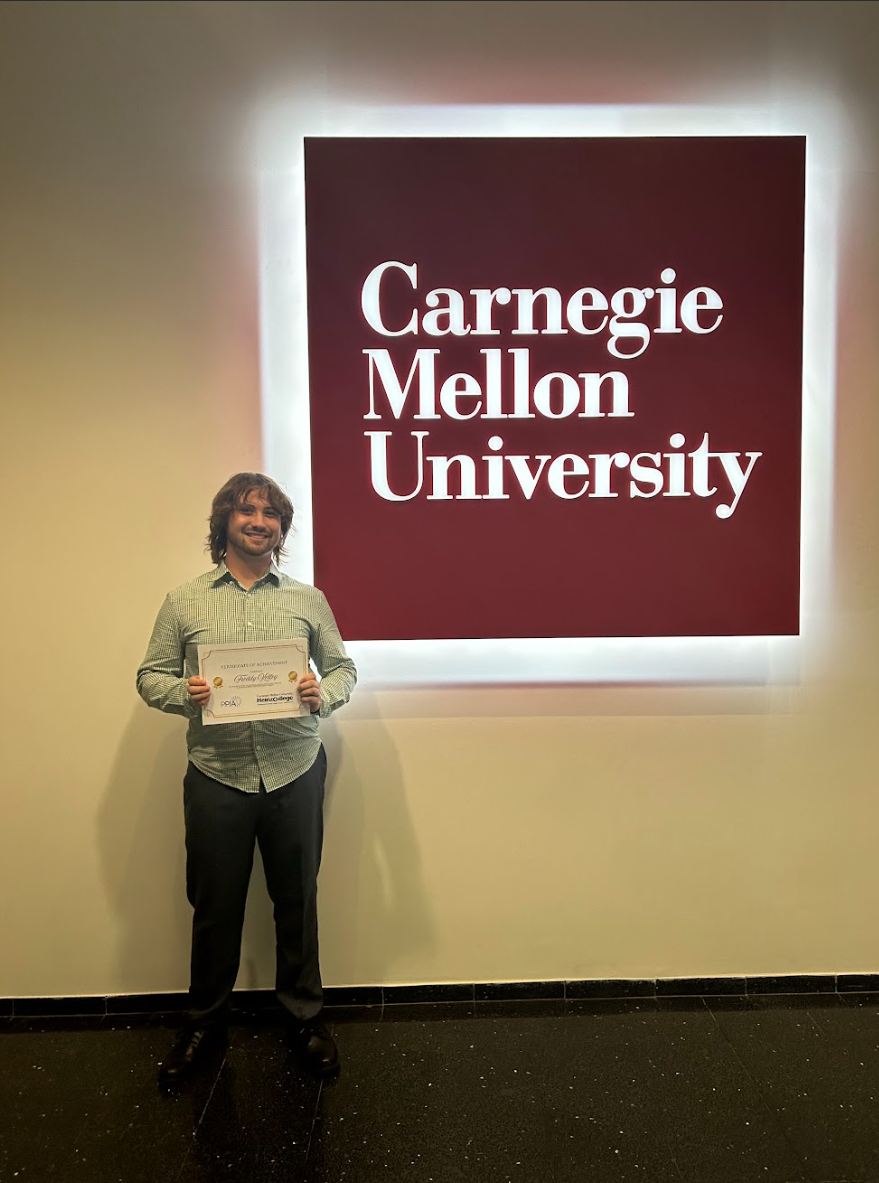Freddy Kelley and Pallavi Patil both participated in the Public Policy and International Affairs Fellowship over the summer. Hosted at some of the top graduate policy schools in the nation, these six-week summer programs prepare students with the knowledge and network to succeed in the field of public service. Freddy studied at Carnegie Mellon University in Pittsburgh, PA, and Pallavi studied a UC Berkeley in Berkeley, CA.
Freddy and Pallavi reflected on their respective experiences with PPIA, highlighting the unique opportunities and classes they took, and what they learned in their six-week programs.
Freddy Kelley
Major: Biochemistry and Sociology
Hometown: Asheboro, NC
I applied for the PPIA Program after attending the All-Park meeting regarding fellowships and meeting with a fellowship advisor at NC State. After discussing my interests in public health and working to create equity through a health-oriented lens, the PPIA JSI was brought to my attention as a possible opportunity to look at this instead through public policy. As I researched the program, I learned about the Carnegie Mellon University track and its focus on community empowerment, social policy, and data analytics. The opportunity to look at social politics at each level excited me because I have always wanted to combine working with people at the policy and data analytics levels.
This summer, I took four classes: Applied Statistics for Public Policy, Poverty Inequality and Social Policies, Understanding Systems of Oppression, and Applied Economics. In these classes, I learned about how to collect research and data about social issues to use as evidence for policy recommendations. Further, I learned about the statistical methods used to evaluate these data. My group’s project was healthcare and we approached this by looking at maternal mortality rates of Black mothers in Pittsburgh. We looked at intersectional issues like food inaccessibility and poverty, as well as assessing the effects of DEI education programs of doctors who practice in Pittsburgh.
I also just attended the PPIA Expo where I had the opportunity to meet and learn from leaders like Micheal Hayes, Special Assistant to the President and Deputy Director in the Office of Public Engagement, Victoria DeFrancesco Soto, Dean of the Clinton School of Public Service at the University of Arkansas, and Alejandra Castillo, U.S. Assistant Secretary of Commerce for Economic Development. At the Expo, I also got to speak to representatives of the Graduate Schools in the PPIA Consortium as well as learn from representatives of various internship and fellowship opportunities like Pew Research, the GAO, the White House Fellowship, and the Payne, Pickering, and Rangel Fellowships.
In one of my classes, I learned about child poverty and the different contexts through which it is present around me and how it intersects with other systems of oppression. Not only did I had the opportunity to look at this sociologically, but also explored how to search for solutions and learn how to write effectively to recommend these solutions in the political sphere. It was great to have the opportunity to meet like-minded peers from all around the US and the World. Connecting with one another, we have pushed each other to grow to encompass a broader understanding of social challenges and solutions.
Through this program, I have had the chance to start my journey in public policy and prepare myself for graduate school. I have found a passion to pursue public policy and continue advocating for my communities. I want to work to create policies that serve the people that it is intended to govern. The JSI has continued to reinforce this and show me the vastness of opportunity out there to initiate change. As I prepare for graduate school and continue finding my path in public health and policy will take the hard and soft skills I am growing to help me advocate and empower the voices of others. Continuing to connect with more and more people has driven my passion for advocacy.



Pallavi Patil
Major: Womens, Gender and Sexuality Studies; Political Science with a concentration in Public Policy
Hometown: Charlotte, NC
I applied to the Public Policy and International Affairs Junior Summer Institute (PPIA JSI), specifically to UC Berkeley’s JSI, to gain insight into the graduate school experience and to engage with the unique opportunities and experiences offered by the program. During this 7-week intensive program, I lived in student housing on campus and took four core classes; these courses included Economics for Public Policy, Law and Public Policy, Policy Analysis, and Quantitative Methods for Public Policy. Each class reflected the core components of a MPP at the Goldman School of Public Policy. These courses were also very collaborative which I enjoyed, particularly drafting a group policy memo in addition to an individual policy memo, wherein I developed a policy solution for a specific education policy issue. My group policy memo addressed the topic of GED programs in state prisons, while my individual memo focused on Algebra II requirements in the University of California system and their implications for low-income students of color.
As JSI Fellows, we also had the privilege of interacting with California government officials, attending appellate court hearings, participating in panels featuring professionals from various sectors of public policy, and taking courses taught by law and public policy professors. We also explored the UC Berkeley campus, including its School of Law and School of Public Policy, and the larger Bay Area.
My participation in this program clarified my future academic and career aspirations, particularly leading me to consider pursuing a master’s or Ph.D. program in Public Policy instead of attending law school. I am now able to more realistically picture graduate coursework in a MPP program as well as life as a graduate student particularly at the Goldman School.
The PPIA alumni network spanning across the country, including my fellow cohort members, will be valuable resources as I move forward. Additionally, the program provides numerous post-completion benefits, including access to free LSAT and GRE preparatory materials, as well as guaranteed scholarships for graduate schools within a consortium of top-ranked institutions, which I hope to utilize in the future. I definitely recommend applying to the program (current juniors only) if you are curious about graduate school in the realm of public policy.